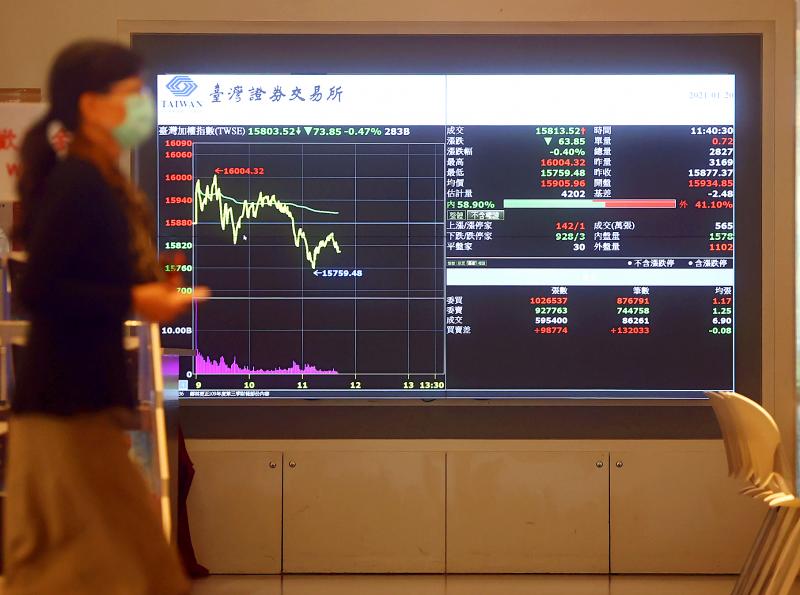Following the TAIEX’s dramatic rise over the past year, investors have turned cautious about the market’s direction going forward, a survey released by Cathay Financial Holding Co (國泰金控) yesterday showed.
Only 10.2 percent of those polled expected the weighted index to hit a peak of 15,500 to 16,000 points and 7.1 percent expected it to end above 16,000 points, the survey showed.
A larger number, 40 percent, expected the TAIEX to peak above 15,000 points by the end of the first half, while 37.1 percent expected it to peak between 14,500 and 15,000 points, it showed.

Photo: CNA
The index fell 0.45 percent yesterday to close at 15,806.18.
The report surveyed 20,912 of Cathay Financial’s clients between Jan. 1 and Jan. 7, when the TAIEX climbed from 14,732 points to 15,214 points.
As a majority of Cathay’s clients are retail investors, their predictions likely reflect public confidence in the market rather than a research-based forecast about the market, a Cathay Financial official surnamed Wu (吳) told the Taipei Times by telephone.
“Given that when we conducted a similar poll in January last year, with the TAIEX at about 12,000 points at the time, only 27 percent of respondents forecast that the TAIEX would continue climbing and peak above 12,500 points, it seems that Taiwanese are more upbeat about the stock market this year,” Wu said.
Their optimism corresponds with a rise in their risk preference, with 33.3 percent of respondents willing to withdraw their fixed deposits and invest them in the stock market, up from 30.6 percent a month earlier and 25.6 percent a year earlier, Wu said.
Overall, 46.3 percent of respondents expected the TAIEX to continue rising in the next six months, followed by 16.7 percent who believed it would be flat and 23.4 percent predicting that it would decline, the survey showed.
Meanwhile, public confidence in the economy picked up, with 43.8 percent forecasting that the economy would improve in the next six months, up from 42.5 percent a month earlier, which could be attributed to the rising availability of COVID-19 vaccines, Cathay said.
However, respondents’ willingness to buy durable goods, such as vehicles or home appliances, and to make big-ticket purchases, such as travel or shopping, diverged, with the former growing from 20.7 percent a month earlier to 22.6 percent, while the latter declined from 29.5 percent to 28.5 percent, the survey showed.
Wu said it was quite curious, “as people were usually more willing to make big-ticket purchases rather than spending on durable goods during past economic recoveries.”
This might be due to rising demand for electronic goods because of the work-from-home trend or falling demand for travel because of strict border controls, Wu said.

NEW IDENTITY: Known for its software, India has expanded into hardware, with its semiconductor industry growing from US$38bn in 2023 to US$45bn to US$50bn India on Saturday inaugurated its first semiconductor assembly and test facility, a milestone in the government’s push to reduce dependence on foreign chipmakers and stake a claim in a sector dominated by China. Indian Prime Minister Narendra Modi opened US firm Micron Technology Inc’s semiconductor assembly, test and packaging unit in his home state of Gujarat, hailing the “dawn of a new era” for India’s technology ambitions. “When young Indians look back in the future, they will see this decade as the turning point in our tech future,” Modi told the event, which was broadcast on his YouTube channel. The plant would convert

‘SEISMIC SHIFT’: The researcher forecast there would be about 1.1 billion mobile shipments this year, down from 1.26 billion the prior year and erasing years of gains The global smartphone market is expected to contract 12.9 percent this year due to the unprecedented memorychip shortage, marking “a crisis like no other,” researcher International Data Corp (IDC) said. The new forecast, a dramatic revision down from earlier estimates, gives the latest accounting of the ongoing memory crunch that is affecting every corner of the electronics industry. The demand for advanced memory to power artificial intelligence (AI) tasks has drained global supply until well into next year and jeopardizes the business model of many smartphone makers. IDC forecast about 1.1 billion mobile shipments this year, down from 1.26 billion the prior

People stand in a Pokemon store in Tokyo on Thursday. One of the world highest-grossing franchises is celebrated its 30th anniversary yesterday.

Zimbabwe’s ban on raw lithium exports is forcing Chinese miners to rethink their strategy, speeding up plans to process the metal locally instead of shipping it to China’s vast rechargeable battery industry. The country is Africa’s largest lithium producer and has one of the world’s largest reserves, according to the US Geological Survey (USGS). Zimbabwe already banned the export of lithium ore in 2022 and last year announced it would halt exports of lithium concentrates from January next year. However, on Wednesday it imposed the ban with immediate effect, leaving unclear what the lithium mining sector would do in the